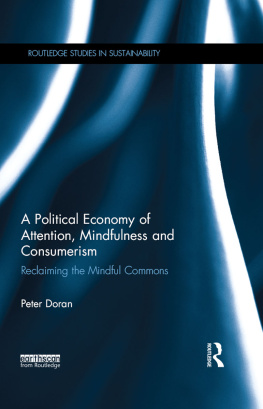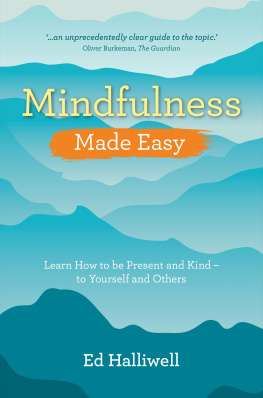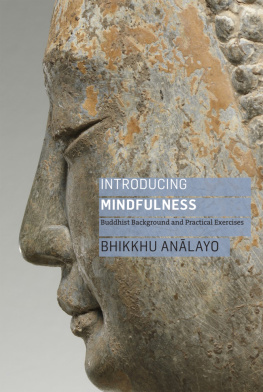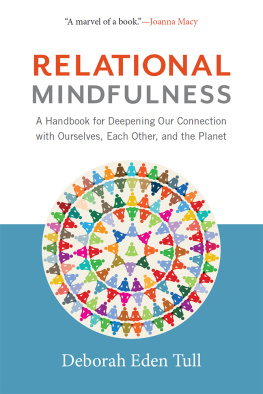A Political Economy of Attention, Mindfulness and Consumerism
The power of capital is the power to target our attention, mould market-ready identities, and reduce the public realm to an endless series of choices. This has far-reaching implications for our psychological, physical and spiritual well-being, and ultimately for our global ecology. In this consumer age, the underlying teachings of Buddhist mindfulness offer more than individual well-being and resilience. They also offer new sources of critical inquiry into our collective condition, and may point, in time, to regulatory initiatives in the field of well-being.
This book draws together lively debates from the new economics of transition, commons and well-being, consumerism, and the emerging role of mindfulness in popular culture. Engaged Buddhist practices and teachings correspond closely to insights in contemporary political philosophical investigations into the nature of power, notably by Michel Foucault. The attention economy can be understood as a new arena of struggle in our age of neoliberal governmentality; as the forces of enclosure having colonized forests, land and the bodies of workers are now extended to the realm of our minds and subjectivity. This poses questions about the recovery of the mindful commons: the practices we must cultivate to reclaim our attention, time and lives from the forces of capitalization.
This is a valuable resource for students and scholars of environmental philosophy, environmental psychology, environmental sociology, well-being and new economics, political economy, environmental politics, the commons and law, as well as Buddhist theory and philosophy.
Peter Doran is a lecturer at the School of Law at Queens University Belfast, Northern Ireland.
Routledge Studies in Sustainability
A full list of titles in this series is available at:
www.routledge.com/Routledge-Studies-in-Sustainability/book-series/RSSTY
Social Practices, Interventions and Sustainability
Beyond behaviour change
Edited by Yolande Strengers and Cecily Maller
The Politics of Sustainability
Philosophical perspectives
Edited by Dieter Birnbacher and May Thorseth
Promoting Sustainable Living
Sustainability as an object of desire
Justyna Karakiewicz, with contributions from Audrey Yue and Angela Paladino
Rethinking the Green State
Environmental governance towards climate and sustainability transitions
Edited by Karin Bckstrand and Annica Kronsell
Energy and Transport in Green Transition
Perspectives on ecomodernity
Edited by Atle Midttun and Nina Witoszek
Human Rights and Sustainability
Moral responsibilities for the future
Edited by Gerhard Bos and Marcus Dwell
Sustainability and the Art of Long Term Thinking
Edited by Bernd Klauer, Reiner Manstetten, Thomas Petersen and Johannes Schiller
Cities and Sustainability
A new approach Daniel Hoornweg
Transdisciplinary Research and Practice for Sustainability Outcomes
Edited by Dena Fam, Jane Palmer, Chris Riedy and Cynthia Mitchell
A Political Economy of Attention, Mindfulness and Consumerism
Reclaiming the mindful commons
Peter Doran
A Political Economy of Attention, Mindfulness and Consumerism
Reclaiming the Mindful Commons
Peter Doran
First published 2017
by Routledge
2 Park Square, Milton Park, Abingdon, Oxon OX14 4RN
and by Routledge
711 Third Avenue, New York, NY 10017
Routledge is an imprint of the Taylor & Francis Group, an informa business
2017 Peter Doran
The right of Peter Doran to be identified as author of this work has been asserted by him in accordance with sections 77 and 78 of the Copyright, Designs and Patents Act 1988.
All rights reserved. No part of this book may be reprinted or reproduced or utilised in any form or by any electronic, mechanical, or other means, now known or hereafter invented, including photocopying and recording, or in any information storage or retrieval system, without permission in writing from the publishers.
Trademark notice: Product or corporate names may be trademarks or registered trademarks, and are used only for identification and explanation without intent to infringe.
British Library Cataloguing-in-Publication Data
A catalogue record for this book is available from the British Library
Library of Congress Cataloging-in-Publication Data A catalog record for this book has been requested
ISBN: 978-1-138-01597-5 (hbk)
ISBN: 978-1-315-79407-5 (ebk)
Typeset in Goudy
by FiSH Books Ltd, Enfield
For Stephanie, Oisn and Amhairghin
Contents
The process by which capitalist investment seeks to reengineer and privatize nature, government, social life and even genes and physical matter is at once breathtakingly ambitious, subtle and insidious. The great contribution of Dr Peter Dorans A Political Economy of Attention, Mindfulness and Consumerism is to show how this process is also aimed, with systemic zeal, at human consciousness itself. Whether we realize it or not, our minds and culture are being colonized by markets through advertising and data-mining, entertainment media and social networking. The hidden political and economic struggle of our times is focused on shaping our inner lives.
This is a large, complicated story based on neoliberal capitalisms impact on everyday life: frantic work schedules, declining wages, wealth inequality, and austerity politics, all of which have led to a degradation of public services, social amenities and neighbourliness. It turns out that consumerism and market growth, diligently supported by the state, are not in fact maximizing utility, as economists would have it. They are breeding personal despair, precarity, alienation and social dysfunction.
The good news is that people are discovering paths of escape from the capitalist phantasmagoria. More: They are creating new zones of self-organized commoning that meet needs and produce things in more socially constructive ways, independent of the state and market.
This trend can be seen in the growing interest in care of the self and mindfulness, and in the surge in civic engagement and social mutualism. A robust and expanding digital culture, especially among the younger generation, is discovering the virtues of social collaboration. People are waking up to the huge costs and limitations of the free market system and convivial, life-enhancing dimensions of open-source, commons-based approaches.
A neglected problem, however, is how to build new enabling structures of law and governance to protect such spacious ideals of human life from marketization. One hopeful sign are the dozens of one-off legal hacks that attempt to carve out protected zones for commoning, such as Creative Commons licenses to enable legal sharing, multi-stakeholdler co-operatives for social services, and land trusts to protect the interests of future generations.
Important as these innovations are, what we really need are systemic legal strategies for moving beyond homo economicus. Law and policy need to honour the nested I, in which the individual is seen as integrated within larger ecological and social systems. In Dorans words, the symbolic architecture of social power must change so that we can shift from a world based on transactions to one based on relationships. In effect, we must reinvent the political economy of attention.














